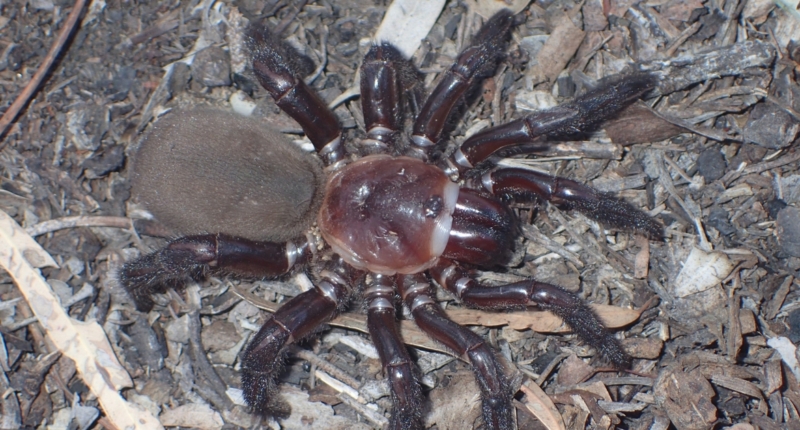A new, giant species of trapdoor spider, Euoplos dignitas, has been discovered in Queensland, Australia. It is described as “rare” and “secretive” due to its reclusive nature and the fact that it is found in only a few locations around Monto and Eidsvold, in the Brigalow Belt of Queensland. Euoplos dignitas can grow to nearly 2 inches long and builds its burrows underground in the soils of open woodlands, like many other trapdoor spiders. This newly discovered species is not considered a threat to humans due to its reclusive nature. However, it has lost much of its habitat due to land clearing in the area, which means that the species is likely to be classified as endangered. The discovery of Euoplos dignitas is significant for researchers at the Queensland Museum, as it is helping them unlock knowledge about biodiversity in the Queensland area and in the museum’s collections.
New Species of Giant Spider Found in Queensland, Australia
Researchers at Queensland Museum have identified a new species of trapdoor spider in Queensland, Australia, which they describe as “rare” and “secretive.” The newly discovered species, named Euoplos dignitas, can grow up to nearly 2 inches long and can be found hiding in underground burrows on the woodland floor.
The identification of this new spider species was made after four years of intense fieldwork and research by the team at Queensland Museum. They initially found an undescribed species in the museum’s collection, which led to the discovery of Euoplos dignitas.
To confirm that Euoplos dignitas was indeed a new spider species, the research team conducted genetic and appearance comparisons with other species, using the museum’s collection as a physical record for comparison. An extensive research program over the last five years helped reveal that Euoplos dignitas was an undescribed species, but no recent specimens had been collected since 1997. Fieldwork funded by Project DIG, a research collaboration between BHP Mitsubishi Alliance and the Queensland Museum Network, resulted in the rediscovery of the species near Monto.
The spider’s species name, Euoplos dignitas, was named after the project that funded the research, and is derived from the Latin word “dignitas,” meaning dignity or greatness, which reflects the impressive size and nature of the spider.
Females of the species can grow up to nearly 2 inches long, which is “very large” for this type of spider, while males are slightly smaller. However, despite their size, these spiders are not considered a threat to humans due to their reclusive nature.
The discovery of Euoplos dignitas is significant for researchers at the museum, as it is helping them unlock knowledge about biodiversity in the Queensland area and in the museum’s collections. Jim Thompson, CEO of the Queensland Museum Network, stated that Project DIG is helping researchers at the museum discover new species.
In conclusion, the discovery of Euoplos dignitas, a new species of giant trapdoor spider found in Queensland, Australia, is a significant discovery for researchers at Queensland Museum. Despite its impressive size, this species is considered non-threatening to humans and is known for its reclusive nature.
Endangered Giant Trapdoor Spider Species Found in Queensland’s Brigalow Belt
The newly discovered species of trapdoor spider, Euoplos dignitas, is found in only a few locations around Monto and Eidsvold, in the Brigalow Belt of Queensland, Australia. The Brigalow Belt is a wide band of acacia-wooded grassland that runs between the tropical rainforest of the coast and the semi-arid interior of central eastern Queensland. The species has lost much of its habitat due to land clearing in the area, and is therefore likely to be classified as endangered.
Euoplos dignitas builds its burrows underground in the soils of open woodlands and eats ground-dwelling invertebrates, just like many other trapdoor spiders. This species has a lidded den, unlike many of its counterparts.
The research on this newly discovered spider species was published in the Journal of Arachnology on March 15, 2023.
Don’t miss interesting posts on Famousbio









